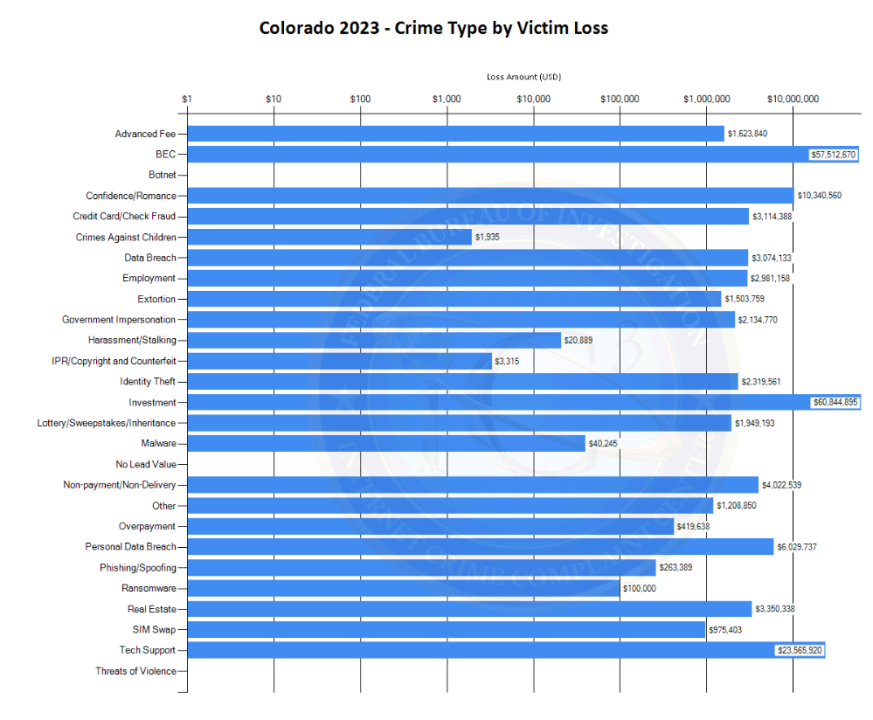Coloradans lost millions due to scams in 2023
DENVER (KDVR) — The Federal Bureau of Investigation released a report about the top scams that impacted Coloradans last year, which amounted to almost $200 million lost.
If that sounds like a lot, that’s because it is.
‘Very uncomfortable’: Homeowner warns about overpayment scam
Scammers stole $187,621,731 from 11,475 Coloradans last year, making Colorado one of the top states in the country to fall victim to scammers. Last year put Colorado at seventh in the nation for complaints per capita, according to the FBI.
Text message scams
“Before they were more focused with social media use, but now they’ve gone to just sending text messages to anybody and everybody with the hopes that somebody will respond,” FBI Supervisory Special Agent Brian Blauser told FOX31.
Many residents are receiving strange text messages from strangers with simple greetings, some just saying, “Hi.” Blauser cited other examples.
“Hey, were you at the meeting last week? You usually respond with ‘wrong number,’ right? So the bad guys will then engage that person and continue to try to start the dialogue with them to really start that relationship building,” Blauser said.
Scammers pose as your boss
One of the worst tactics is pretending to be the victim’s employer, knowing that person is likely to do whatever they are asked to do. One scam involved sending a fake management email to an employee requesting they secretly buy gift cards for the staff and send them to the scammer — posing as the boss — for distribution.
“They’re going to sit back and monitor your boss’ email account to see who is involved in the business, what type of business it is. They’re going to do some social media scrubbing, figure out who are the players in the business to figure out really where or who might be in charge of sending money within the company,” Blauser said.
Tech support scams
Tech support scams convince the victim that the dutiful worker has uncovered a serious problem.
The victim usually receives a random call or email. The scammer says all you have to do is give them control of your computer so they can provide assistance. If the scam is successful, you’ve just handed over access to your passwords and bank account information.
Protect you and your identity from scammers
Regardless of the scam, the FBI says there’s one way to protect your identity and your money: Check any request for information or money out for yourself by only using your own trusted contact information.
“No company is going to come and say there’s fraud in your account, we need to set up a protected bank account for you, now wire all your funds to this place — right? That’s not how business operates,” Blauser said.
Colorado 1 of 9 states with injuries from counterfeit or mishandled Botox: CDC
The FBI also warns against responding to random callers or emails asking you to buy gift cards to pay for bills or services.
Scammers can access basic contact information by using malicious software. Be careful about the information you share online and how many websites you visit that request personal information.
Coloradans lost the most money to these scams
Some scamming crimes were reported more than others. Here’s how much money the state lost in total for each type of crime:
2023 Colorado victims by dollar (Courtesy of FBI) 2023 Colorado victims by dollar (Courtesy of FBI)
The top three schemes with the largest dollar amount were investment fraud ($60 million), business email compromise ($57 million) and tech support ($23 million).
“Sadly, we routinely see victims from all walks of life whose livelihoods and life savings have been wiped out by scammers,” said FBI Denver Special Agent in Charge Mark Michalek. “Criminals continue to develop new tricks to defraud people, so think twice before clicking on a link and report suspicious activity to law enforcement.”
But Coloradans aren’t alone.
Most reported scams nationwide
While scamming has been a reoccurring issue throughout the years, last year’s losses increased by nearly $9 million over the 2022 dollar amount.
Phishing scam dupes Jefferson County couple out of $137K
Nationwide, the top three scams most frequently reported by victims were phishing/spoofing, personal data breach and non-payment/non-delivery. Meanwhile, ransomware increased more than any other scheme, resulting in more than $59.6 million lost last year.
The report showed that victims 30 to 49 years old were most likely to report losses from investment fraud. Those older than 60 accounted for more than half of losses to tech support scams, amounting to more than $3 billion – and these numbers are just from reported crimes.
The FBI suggests filing a complaint at its website if you feel you have been a victim of a cyber-enabled crime.
For the latest news, weather, sports, and streaming video, head to FOX31 Denver.


